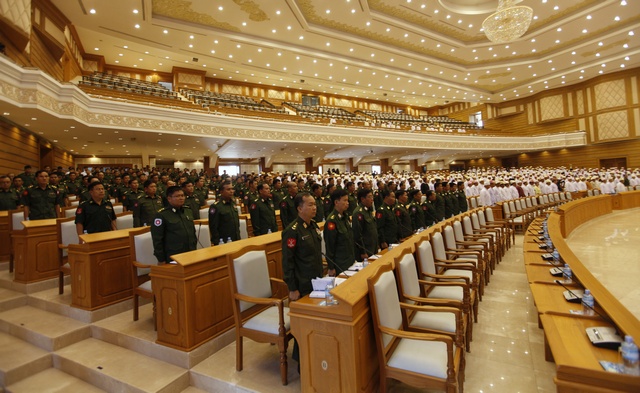Amid a flurry of semantic indignation, the National League for Democracy (NLD) has led a boycott against parliament, refusing to swear an oath to “safeguard” the constitution.
There is no doubt that the controversial 2008 legislation, which guarantees the military a dominant role in politics, is a key obstacle to genuine reform in Burma. But this week’s largely symbolic dispute over wording is likely to serve as a distraction from the real challenges ahead.
While constitutional reform has always formed part of Aung San Suu Kyi’s political agenda, the current furore seems disproportionate, poorly timed and ultimately counter-productive. It is very unlikely that the government will attempt to hinder, or criminalise, future efforts to amend the constitution within the decidedly limited provisions that exist. The NLD still cannot secure the 75 percent parliamentary support required for an amendment without broad-scale military support.
“Despite what Aung San Suu Kyi says the prospect of constitutional reform ahead of [the next general election in] 2015 is quite remote,” Professor Ian Holliday, University of Hong Kong, told DVB.
It is possible that Suu Kyi and her party have begun to realise the unwarranted level of legitimacy their participation has already lent the new government, and subsequently the flawed constitution. Their boycott coincides with the EU’s official suspension of all remaining economic sanctions against Burma – opening its borders to some 800 investment-hungry companies. So it is conceivable that they would seek to deflect criticisms of tacit complicity.
“[The] NLD has already compromised greatly in order to participate in the regime-dominated political process,” Debbie Stothard from the Alternative ASEAN Network on Burma told DVB. “If the authorities do not compromise, they are proving that these so-called reforms are merely a publicity gimmick to gain foreign aid and investment.”
But the relatively minor issue of the oath pales in comparison to the mammoth task of altering the law, and the NLD should have been aware of the risks when it agreed to participate in the April elections. President Thein Sein has never explicitly promised to amend the constitution. Nor did Suu Kyi make its reform an overt priority during her dialogue with the west over sanctions. So if she is hoping to exploit her international reputation as traction, her timing is poor.
The NLD now faces a precarious dilemma. If the oath is not amended, they must either publicly back down or risk losing their seats after 15 days as stipulated by Article 130 of the constitution. In the more likely scenario that Thein Sein agrees to compromise, they will win a small symbolic victory at the expense of substantial political currency.
Either way, the affair demonstrates their inexperience in navigating Burma’s new political landscape. When asked if the NLD’s absence will create a political stalemate, Union Solidarity and Development Party (USDP) General Secretary U Htay Oo laughed: “I don’t think that should be the case as they are only 40 people and we are the majority here.”
Meanwhile, the military has been solidifying its position in parliament. On Monday, it replaced 59 of its 166 unelected parliamentary representatives guaranteed by the constitution – 39 to the lower house and 20 to the upper house. All of the seats were given to more senior ranking military personnel, including colonels and brigadier generals. The announcement was made hours before the resumption of Burma’s parliament in clear anticipation of the NLD’s arrival.
Other minority parties have expressed dismay over the NLD’s decision.
“I am sorry that they didn’t attend the parliamentary session, as we want them to attend,” Nang Wag Nu of the Shan Nationalities Democracy Party told RFA.
“Changing the law as they want can only be done from within parliament, not from outside. They should come into parliament, get the 20 percent needed to propose the change, and then get the 75 percent support [needed to get the change passed]. It can be done,” she said.
Whether or not this is true, the new minority party should be setting out a political roadmap to 2015. The next three years will form a crucial building block to the next general election, especially as Suu Kyi does not qualify to run for president under the current constitutional restrictions against having a foreign spouse.
If the NLD is serious about achieving constitutional reform – however incremental – they will need to start reaching out to moderates within the USDP. Moreover, as the west begins to lift sanctions, adept policies on issues like health, education, minority rights and social development will be needed more than ever.
The NLD has taken the strategic decision to enter politics; now they must start thinking like politicians.



